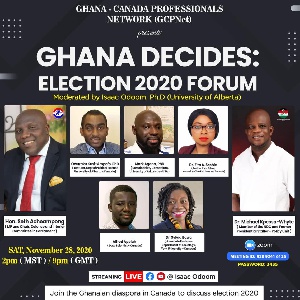 The virtual forum was held on Saturday, November 28, 2020
The virtual forum was held on Saturday, November 28, 2020
Dr. Owuraku Kusi-Ampofo, a Lecturer at the Department of Political Science, University of Alberta, Canada, has called for abolishing BECE and converting SHS boarding systems to Community Day Schools.
Speaking at an online event organised by the Ghanaian Diaspora in Canada on November 28 to discuss issues relating to the 2020 elections in Ghana, Dr Kusi-Ampofo commended the NPP government for its bold and progressive free Senior high school policy. However, he argued that free education can be made more cost-effective. He called for the need to extend basic education to include senior high school and introduce a day school system which will allow every child to be schooled in their own community thereby making education less expensive while ensuring quality access.
To ensure basic education is redefined to include senior high school, Dr Kusi-Ampofo said the BECE must be abolished. “The BECE is a structural barrier; dictating who goes to high school and whose education is truncated,” he concluded.
The online event dubbed: “Ghana Decides: Election 2020 Public Forum” was organised by a group called Ghana-Canada Professional Network (GCPNet) and brought together representatives of the NPP and NDC who explained their campaign manifestos to Ghanaian academics, students, professionals and community activists based in Canada.
“As Ghanaians living abroad, we are affected in different ways by events leading to the election, and election outcome,” said Dr Isaac Odoom, coordinator of the event and Lecturer at the University of Alberta, Canada.
Speakers at the event deliberated on several issues including education, corruption, election management, COVID-19, gender and election results.
On education, Dr Zita Seshie of University of Saskatchewan reflecting on her doctoral research findings reminded policy makers of the need to continue to pay attention to girls’ education and retention in basic schools. While happy with the free feeding policy for students, she bemoaned what she described as “the politicization of education policy in Ghana”. She said, “education is a social policy and so we must not play politics with it to merely entice people for votes.” Ghana needs a national development plan on education that is progressive, spans decades and not driven by partisan considerations, she said.
Ghana's electoral commission (EC) was also put on the spotlight. Dr Mark Agana of the University of Arkansas, praised the EC for its work since 1992, adding that Ghana’s EC is probably the best of such institutions in Africa in terms of its competence and credibility. Pointing to EC’s data on the new 2020 voters register, Dr Agana observed that the number of voters in the Volta region and Upper East region recorded a marginal increase of 0.04% and 0.40% (respectively) from the 2016 register compared to 35% increase in Greater Accra and 11% in Ashanti region. Curious about what may have accounted for the difference in number disparity, he called on the EC and the government to live above perception of attempts of voter suppression in some regions given its implications on fair elections.
Dr Sylvia Bawa of York University, Toronto, spoke about the need for a paradigm shift in Ghana politics and governance systems. She called for a return to inclusive politics and governance premised on principles of ethics and social justice. On gender and women in governance, she argued that the misconception about women not doing enough to occupy elected offices must be dispelled. “Women have always been involved and worked extra hard to gain power and to control the circumstances of their lives.” As a structural issue, “women have been disempowered deliberately and continue to be through policies that keep emphasizing the status quo.” To address the issue of structural male privilege will require “decolonizing our thinking and moving away from the backward western system we have been blindly following” she concluded.
The NPP and NDC representatives responded to comments and questions and spoke about their campaign messages. Hon Seth Acheampong – NPP MP for Mpreaso and Chairperson, Defence and Interior Committee in Parliament described the NPP’s One District One Factory (1D1F), Planting for Food and Jobs and Free SHS as the top policy achievement of Nana Addo Dankwah Akufo Addo’s government. He said these interventions have provided food security and jobs for farmers. Free SHS has provided security for the future of the youth of Ghana and IDIF is bringing back industrialization and reviving dead business.
On his part, Dr. Michael Kpessa-Whyte – Member of the NDC, and Former Presidential Staffer (Policy Unit) reminded the audience of the infrastructure achievement of the NDC under Former President John Dramani Mahama. Dr Kpessa-Whyte said the NDC is poised to defeat staggering poverty in Ghana by putting the people first through investing in healthcare, education, road, agriculture and energy sectors. He added that the new policy of 1million jobs among other initiatives will create economic opportunity for all Ghanaians under Mahama’s administration.
Mr Afred Appiah, a data scientist, in his analysis of election data pointed to nine constituencies that have always correctly voted for the winner of the presidential elections from 1996. Three of the constituencies (Ablekuma Central, Klottey Korle, and Krowor) are in the Greater Accra region, four (Agona East, Awutu Senya West, Efutu and Gomoa East) are in the Central Region, and two (Jomoro and Shama) are in the Western region. “On election night you should pay very close attention to results coming in from those nine constituencies” he concluded.
Dr Isaac Odoom, ended the forum by calling on all Ghanaians to be peaceful in their conduct during the election and encouraged all eligible Ghanaians to exercise their civic duty and right to vote on December 7, 2020.